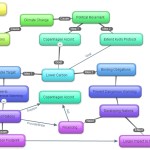Due to the use of fossil fuels, there has been a large production of carbon in the atmosphere, causing climate change. As global warming becomes a bigger issue, governments around the world have tried to resolve this by working together and setting limitations. Both the Kyoto Protocol and Copenhagen Accord are examples of this effort, as their aim was to lower carbon. The first option, though, places a binding obligation on rich nations. Developed nations, like the United States of America, dislike this and favor the latter agreement, which allows nations to set reasonable but lower targets for future carbon emissions. Yet, this strategy does not guarantee avoiding dangerous global warming, whereas the other option is more likely to do so. Unfortunately, developed nations, once again like the United States of America, tend to have a larger carbon footprint, while the developing nations are often largely impacted by their actions. Thus, they not like the Copenhagen Accord, especially since they do not have ample financial support to follow through with it. As a result, developed nations offered financial aid to developing nations as a way to bribe them into supporting the Copenhagen Accord.
These main points of the article are shown in exactly this order throughout the diagram. For example, the fossil fuels creating carbon causing climate change is the beginning. This moves onto show that countries working together worked on a political movement, which included the Accord and Protocol, both aiming to lower carbon- a core factor of global warming. The chart shows the difference in how the two methods try to achieve this similar goal and the varying effects of each. Next, it shows how developed nations favor one and the developing nations favor the other because of the gap in the unfair allocation of responsibility for carbon footprints. Lastly, the flow ends with developed nations attempting to convince developing nations otherwise.
As the module explains, climate change threatens crossing the planetary boundary and making the Earth unstable. Therefore, it as a global effort is an important issue. Therefore, the cables should have been publicized because transparency is necessary for global effort; it is important for everyone to work together, as tacky as that sounds. It is hard to claim whether the United States should have been conducting climate change diplomacy in the way that they were. Ethically, I suppose it’s wrong, even if just for their effort to make it a secret. Logically, it seems the most effective unfortunately. It is extremely difficult to have a nation (not only the U.S.) revert from its norm; the country heavily depends on coal, oil, and other polluting sources for energy. Module 9 admits that the increase in our use of fossil fuels during the Industrial Revolution improved our health and wealth. A sudden strict limitation would be hard and may not even work, possibly causing motivation for more secrecy. Also, convincing developing nations to support the Accord seems to have another advantage: aid in finance, which may be beneficial. Ethically, U.S. and others should take full responsibility for their actions and stop further harm, especially since it has had harmful temperature and water shifts. Logically, it will be more possible and effective to attempt to improve their methods and prevent further harm. This logical step would be an attempt to adapt and as the module explains, that could “reduce the amount of harm caused.”


Hello Humna, my name is Peter Han and am planning on studying mechanical engineering here at Penn State. I found your post very interesting as we both talked about the ethics behind the United States decision and how it should not be supported. I would never agree with doing something ethical even if it makes sense to get support for the accord. I think the United States should take responsibility for their actions as well as their own carbon footprint. It is more important that we implement climate change policies than if smaller countries who do not have much of a carbon footprint were to implement the same policies.
Here is a link to my blog: http://geog030.dutton.psu.edu/2016/04/08/peter-han-module-9/
Hello Humna,
Here is a link to my post: https://wp.me/p3RCAy-ekq
We talked about the same things about how climate change and fossil fuels were the cause. What caught my interest the most was “Ethically, U.S. and others should take full responsibility for their actions” in your last few sentences. I also agree that the U.S. should take full responsibility. Like i mentioned in my post, they kind of went through some underhanded ways to get support for the accord.